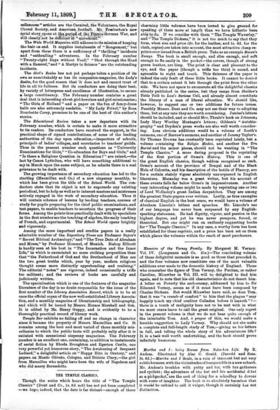THE TEMPLE CLASSICS.
- Though the series which bears the title of " The Temple Classics" (Dent and Co., ls. 6d. net) has not yet been completed --we hope, indeed, that the date is far distant—enough of these
charming little volumes have been lasted to give ground for speaking of them more at length than we have hitherto been able to do. If we consider with them " The Temple Waverley," and "The Temple Dickens," it is not too much to say that they form, when size and price (2s. for the leather, and ls. 6d. for the cloth, copies) are taken into account, the most attractive cheap re- prints ever issued from a British press. Take as an example Bacon's Essays. The book is small enough, and slim enough, and soft enough to lie easily in the pocket—the covers, though of strong green leather, are limp. The print is clear and pleasant to the eye, and the paper (though a trifle too thin) is sound, and agreeable to sight and touch. This thinness of the paper is indeed the only fault of these little books. It cannot be denied that to a certain extent it lets through the print from the other side. We have not apace to enumerate all the delightful classics already published in the series, but they range from Sheldon's Table Talk to Law's Serious Call, and already almost constitute the library of a man of liberal education. We should like, however, to suggest one or two additions for future issues. Possibly Messrs. Dent and Co. may not see their way to adopting there, but at any rate they are worth considering. Junius's letters should be included, and so should Mrs. Thrale's book on Johnson; Lady Mary Wortley Montagu's letters ; Gibbon's " Autobio- graphy " and Dryden's prose works are also well worth consider- ing. Less obvious additions would be a volume of South's sermons, one of Barrow's sermons, and another of Jeremy Taylor's. Sir Thomas Browne has constantly been reprinted lately, but a volume containing the Religio Medici, and another the This Burial and the minor pieces, should not be wanting in "The Temple Classics." A more daring proposal is the reprinting of the first portion of Orme's History. This is one of the great English classics, though seldom recognised as such. Orme's account of the province of Bengal and of the Black Hole of Calcutta, and his description of the battle of Plessey, are for a certain stately vigour absolutely unsurpassed in English literature. Macaulay was a great writer, but his account of these events falls far below Orme's in impressiveness. Another very interesting volume might be made by reprinting one or two of Lord Wellesley's great Indian despatches. They are among the greatest State-papers ever written. Lastly, as true examples of classical English in the best sense, we would have a volume of Abraham Lincoln's letters and speeches. Mr. Lincoln's use of our language has never been surpassed by any English- speaking statesman. He had dignity, vigour, and passion in the highest degree, and yet he was never pompous, forced, or theatrical. But one might. run on endlessly suggesting books for " The Temple Classics." In any case, a worthy form has been established for these reprints, and a price has been set on them which places the volumes within the reach of most purchasers.






































 Previous page
Previous page